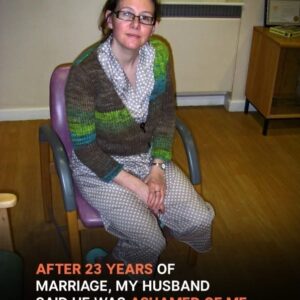A Long Road to Self-Discovery and Empowerment
For over a decade, I shared my life with Eric. At first glance, our 12-year marriage seemed to be built on love and commitment, but behind closed doors, the reality was far more complicated. While I cared deeply for him, there was an undercurrent of imbalance that grew with each passing day. We had two wonderful children—Lily, then 10, and Brandon, 5—and as our family expanded, so too did my responsibilities. From the very beginning, I took on almost every task required to run our household. I worked part-time from home, managed all the laundry, cooking, cleaning, school runs, bedtime routines, and even cared for the kids during their sick days. In contrast, Eric’s contribution to the family was largely limited to the financial support provided by his paycheck. After a long day at work, he would come home, sink into the couch, and lose himself in television shows or video games—rarely offering even the smallest bit of help.
At the age of 32, I found myself on the verge of complete exhaustion. The relentless demands of daily life were overwhelming, and the lack of shared responsibility left me feeling isolated and resentful. Every day, as I juggled the never-ending to-do lists and the emotional labor of managing our household, a quiet frustration grew within me. I was beginning to wonder if this imbalance was something I could live with much longer.
The Breaking Point
The mounting pressure eventually reached a tipping point. It was not a single incident but rather a slow accumulation of countless moments where I felt taken for granted. One seemingly ordinary morning, after weeks of barely managing to catch a breath, I decided to take a small step towards self-care. I planned to have a brief coffee outing with my best friend—a rare moment of respite that I so desperately needed. In that fleeting moment of hope, I asked Eric to watch the kids for just one hour, trusting that he would finally understand my need for a break.
His response, however, was as disheartening as it was abrupt. “I’m tired. I worked all week. Take them with you,” he mumbled without even looking up from the television. His words, dismissive and cold, sent a shock through me. I had expected a partner who, at the very least, would recognize my exhaustion. Instead, I was met with a stark reminder of the unequal dynamics that had defined our relationship for so long.
“Eric, I need a break. Just an hour,” I pleaded, trying to convey the urgency of my request.
But his reply was even more cutting. “You’re the mom. Moms don’t get breaks. My mom didn’t need one, and neither did my sister.” In that moment, his words felt like a betrayal—a dismissal of the hard work I was doing day in and day out. They cut deep, reinforcing the notion that my efforts, though tireless, were expected as a given rather than appreciated as the cornerstone of our family.
That conversation marked the final straw in a long line of disappointments. The combination of my mounting exhaustion and his blatant indifference left me with no choice but to reexamine everything I had long tolerated.
The Controversial Proposal
The tension that had been simmering beneath the surface finally erupted a few days later during a family dinner. As we sat around the table, Eric casually introduced a suggestion that I could never have anticipated. “We should have another baby,” he announced, his voice imbued with excitement as if the idea were as natural as breathing.
I was taken aback. The thought of adding a third child to an already overburdened household was unfathomable. “Another? Eric, I’m barely managing with two, and you’re talking about adding more to my plate?” I countered, my tone laced with incredulity and frustration.
Instead of engaging in a constructive dialogue, Eric’s response was dismissive. “We’ve done it before. What’s the big deal?” His casual attitude toward a decision that would profoundly impact every aspect of our lives further underscored the disparity in our perspectives on parenting and partnership.
Unable to hold back any longer, I voiced what had been building inside me for years. “The big deal is that I do all the work. You don’t help. I’m the one running myself ragged, and I’m not going to pretend everything’s fine anymore.” My words, raw and unfiltered, were a direct indictment of the unequal burden that had defined our marriage.
Eric’s face hardened with anger, yet he seemed unable to truly grasp the gravity of my concerns. To make matters worse, his mother Brianna and his sister Amber were visiting that evening. Instead of offering support or empathy, they rushed to Eric’s defense as soon as they overheard our exchange.
“Eric works hard to provide for this family,” Brianna stated in a tone that was both cold and judgmental. “You should be grateful for that.”
Amber joined in without hesitation. “You sound spoiled. Mom raised both of us without complaining.” Their words, meant to downplay my feelings, only served to validate my sense of isolation and frustration. I felt as though I were being attacked by an entire support system that refused to acknowledge the imbalance that plagued our home.
“Grateful for what?” I snapped, my voice trembling with a mixture of anger and hurt. “A husband who thinks fatherhood ends after conception? Raising kids isn’t a one-person job, and pretending it is doesn’t make me ungrateful. It makes me honest.” My words hung in the air, a clear declaration that I would no longer tolerate being diminished or dismissed.
Despite my outburst, Eric and his family seemed entrenched in their outdated mindset. They were unable—or unwilling—to see the sheer magnitude of my exhaustion and the emotional toll it was taking on me. That very night, Eric repeated his suggestion, insisting that we try for a third child. His persistence only reinforced one undeniable fact: he was not going to change.
Taking a Stand
I realized that if I were to continue down this path, the consequences for my well-being—and for the well-being of my children—would be dire. It was clear that something had to change. With my heart pounding and my resolve hardening, I made a decision that would alter the course of my life.
“I’m not doing it, Eric,” I stated firmly, my voice leaving no room for negotiation. “I’m not having another child when I’m already drowning in responsibilities that you refuse to share.”
In that moment, Eric’s eyes narrowed, and his anger rose like a tide. “Pack your things and leave, then. I can’t live like this,” he declared, his tone final and unforgiving.
I was stunned by the sudden ultimatum, but I maintained my composure. “Fine,” I replied coolly. “But the kids stay here. Whoever stays in this house is responsible for them.” My words were not just a refusal to accept his terms; they were a declaration of my commitment to my children’s stability and well-being.
Eric’s face went pale with disbelief. “Wait… what? No way. You can’t be serious,” he stammered, unable to reconcile the new reality I was imposing.
“You heard me,” I said steadily. “You wanted me out? Fine. But the kids need stability, and they’re not going anywhere.” With that, I knew there was no turning back.
The Aftermath of a Difficult Decision
That night, with a heavy heart yet unwavering determination, I left the only home I had ever known. My sister, whose support had been a beacon during these tumultuous times, helped me pack a few essential belongings. The decision to walk away was not made lightly—it was a culmination of years of feeling undervalued, exhausted, and unappreciated. Yet, in that very moment of departure, I felt a sense of liberation that I had not experienced in years.
Eric attempted to call me later that evening, his voice filled with a mix of anger and disbelief. However, by the time his calls came through, my resolve was already set. I was determined to move forward, not as a victim, but as a woman reclaiming her identity and worth.
A few months after that life-altering night, I filed for divorce. The legal process was as challenging as it was emotionally draining, but it was a necessary step toward creating a life where my well-being—and that of my children—was prioritized. In the end, I was granted full custody of Lily and Brandon, and I was able to keep the family home, which provided the stability that the children so desperately needed. Eric, now facing the consequences of his neglect, contributes to our household through child support, but the day-to-day responsibilities of parenting fall solely on my shoulders.
Rebuilding a Life on My Own Terms
Looking back on that period, I can say without hesitation that I do not regret standing up for myself. The journey was neither easy nor swift, but it was essential for my personal growth and the future well-being of my children. By choosing to leave a situation that had drained me emotionally, I sent a powerful message not only to Eric but also to my children—that self-respect and equality are non-negotiable in any relationship.
In the months and years following my departure, I began to rebuild my life with a newfound sense of purpose. I sought professional counseling, joined support groups, and connected with others who had faced similar challenges. The road to recovery was fraught with moments of doubt and sorrow, but it was also filled with opportunities for healing and self-discovery.
Through therapy and introspection, I came to understand that the imbalance in my marriage was not a reflection of my inadequacies, but rather the result of a long-standing dynamic that needed to be challenged and redefined. I learned that it is entirely acceptable—and indeed necessary—to assert one’s own needs and boundaries, even when doing so upends the status quo.
A New Beginning: Finding Strength and Resilience
As I settled into my new life, the process of self-reinvention became a journey of empowerment. I focused on my career, developed new hobbies, and cultivated friendships that reinforced my sense of identity beyond the roles of wife and mother. Every small victory—a successful project at work, a new friendship formed, a moment of self-care—was a reminder that I was capable of thriving independently.
I also became deeply involved in my community, volunteering at local organizations and participating in initiatives that championed women’s rights and family equality. Sharing my story, whether through public speaking or writing, allowed me to connect with others who had felt marginalized or overwhelmed by the demands of an imbalanced relationship. It was in these interactions that I found both solace and inspiration—a validation that my struggle was not isolated, but rather a shared experience for many.
Over time, I began to see that my decision to leave had not only liberated me but also set a powerful example for Lily and Brandon. They witnessed firsthand that sometimes, difficult choices must be made in order to honor one’s own worth and well-being. I made it a point to communicate openly with them about the importance of self-respect, mutual responsibility, and the courage it takes to stand up for oneself. These conversations, though at times challenging, have since become integral to our relationship, fostering an environment where both my children and I feel heard, valued, and empowered.
The Journey Toward Self-Respect
In the midst of my new beginning, I often reflected on the lessons that had been carved into my soul by the years of neglect and imbalance. I came to appreciate that a successful partnership is built on shared responsibilities—where both partners contribute equally to the growth and maintenance of the family. This realization was not only pivotal for my own healing but also served as a guiding principle in my advocacy work.
I began speaking at community events and writing articles that discussed the dynamics of modern relationships. I highlighted how traditional expectations of gender roles often leave one partner bearing the brunt of household responsibilities, which can lead to emotional exhaustion and resentment. Through my work, I aimed to inspire a broader conversation about the need for equitable distribution of domestic duties and the importance of supporting each other as partners.
I detailed how I had managed to break free from a cycle of self-sacrifice that had once defined my existence. I spoke of the days when every morning felt like a battle—a constant rush to prepare breakfast, get the kids ready for school, and clean up after them, all while grappling with the nagging feeling that my contributions were neither recognized nor appreciated. I explained how the turning point had come when I realized that continuing in that vein was not sustainable, and that true strength lay in knowing one’s value and demanding respect.
Professional Insights and Broader Implications
In retrospect, my experience is not just a personal saga but also a reflection of a broader societal issue. The expectation that one parent—usually the mother—should shoulder the majority of domestic and emotional labor is deeply ingrained in many cultures. This narrative is often overlooked in discussions about career advancement, family dynamics, and personal fulfillment.
Drawing on professional insights from sociologists, psychologists, and family therapists, I came to understand that the problem is systemic. Research indicates that couples who share household responsibilities tend to experience higher levels of satisfaction and emotional well-being. Conversely, when one partner is consistently overburdened, it can lead to a cascade of negative effects—from chronic stress and burnout to feelings of isolation and resentment.
By sharing my story on professional platforms and in public forums, I contributed to an ongoing conversation about gender roles and equality in the home. I cited studies that showed how equitable partnerships not only benefit individuals but also strengthen the fabric of the family unit. My narrative became a case study in how transforming personal adversity into a broader advocacy effort can lead to meaningful social change. I encouraged other women, and indeed all partners, to examine their own relationships critically and to seek balance in the distribution of responsibilities.
A Path Forward for My Children
One of the most important aspects of my journey was ensuring that Lily and Brandon understood the value of equality and self-respect. I was determined to break the cycle of imbalance and to teach them that relationships—whether personal or professional—should be based on mutual support and respect. I took every opportunity to engage in honest, age-appropriate conversations about the importance of sharing responsibilities, setting boundaries, and valuing oneself.
I explained to Lily, who had always been perceptive beyond her years, that everyone deserves to have their efforts recognized. Brandon, with his boundless energy and curiosity, learned early on that asking for help was not a sign of weakness but rather a smart strategy for managing the world’s challenges. I encouraged them to share their feelings openly, whether they were dealing with frustrations in school or challenges in their friendships. By modeling these behaviors myself, I hoped to equip them with the tools they would need to form healthy, balanced relationships in the future.
Reflections on Personal Growth and Transformation
Now, as I reflect on the journey that brought me to this point, I am filled with a sense of gratitude for the difficult choices I was forced to make. The process of leaving a long-term relationship is never without pain, yet it is often in the crucible of adversity that true transformation occurs. I have learned that self-respect is not merely a personal virtue—it is a cornerstone of a life lived authentically and with purpose.
The scars from those challenging years remain, but they no longer define me. Instead, they serve as a reminder of the strength and resilience that I discovered within myself. Each day, as I balance the responsibilities of work and parenting, I am reminded of the power that comes from knowing one’s worth. I have come to see that the decision to stand up for oneself, though fraught with risk and uncertainty, is ultimately one of the most liberating acts a person can undertake.
I have also learned that true empowerment involves not only asserting oneself but also extending compassion to those who have wronged us—even if, at times, that compassion must be tempered by the wisdom of self-preservation. While I continue to hold firm boundaries in my relationship with Eric, I have also come to understand that forgiveness, in its truest sense, is about freeing oneself from the chains of past resentment. It is not an act of condoning the actions of others, but rather a deliberate choice to no longer let those actions dictate the terms of one’s life.
Lessons for the Future
The lessons I have learned through this long and arduous journey are both personal and universal. They underscore the importance of recognizing when a relationship has become unsustainable, the courage it takes to make difficult decisions, and the profound impact that self-respect can have on one’s overall well-being.
Shared Responsibility:
A partnership is built on mutual effort and shared responsibilities. The experience taught me that no one should be expected to shoulder the entirety of domestic and emotional labor. A healthy relationship requires both partners to contribute, to listen, and to support one another in equal measure.
Trusting Your Instincts:
There were moments when I questioned my own perceptions, wondering if I was being overly critical or ungrateful. However, my intuition—and eventually, the corroboration of those I trusted—told me that the imbalance was real and unsustainable. Trusting my instincts was key to recognizing that something needed to change.
Self-Respect as a Guiding Principle:
Perhaps the most important lesson of all was the realization that self-respect is non-negotiable. I learned that I deserved to be heard, valued, and supported, both as a partner and as an individual. This newfound self-respect empowered me to take control of my life and to create an environment where my children could thrive.
The Importance of Communication:
While my departure was a necessary step, it also highlighted the critical importance of open, honest communication. Constructive dialogue can often resolve underlying issues before they escalate into insurmountable conflicts. I now advocate for partners to engage in regular, candid conversations about expectations and responsibilities, ensuring that both voices are heard and respected.
Empowering Others Through My Story
In the years following my divorce, I have dedicated myself to sharing my story as a source of empowerment and guidance for others who find themselves in similar situations. I have contributed articles to professional journals, participated in panel discussions, and even facilitated workshops aimed at promoting equality in the home. Through these endeavors, I have connected with countless individuals who have experienced the toll of unbalanced relationships. Many have expressed how my journey inspired them to reassess their own lives, to speak up, and to take the necessary steps toward reclaiming their personal power.
My work has been driven by the belief that every person deserves a partnership where respect and responsibility are shared equally. By transforming my personal struggle into a public narrative, I hope to contribute to a broader societal shift—one where the traditional roles that have long burdened one partner are reexamined and redefined in the interest of genuine equality.
A New Chapter of Resilience and Hope
Today, I stand not only as a survivor of an imbalanced relationship but as a thriving, independent individual who continues to advocate for equality and mutual respect in all forms of partnership. The challenges I once faced have become stepping stones on the path to a future filled with hope and possibility.
I am proud of the life I have rebuilt—one that is characterized by hard-won independence, a supportive network of friends and family, and, most importantly, a deep sense of self-worth. Every morning, as I wake up and prepare to face the day, I am reminded that my journey, with all its twists and turns, has made me the strong, resilient person I am today.
My children, Lily and Brandon, remain at the heart of my motivation. Their well-being and happiness continue to inspire me to strive for a better world—one in which fairness, respect, and shared responsibility are not just ideals, but everyday realities. I am committed to ensuring that they grow up in an environment that models healthy relationships and teaches them the value of standing up for themselves.
Looking Back, Moving Forward
Reflecting on the past, I am aware of the tremendous sacrifices and emotional toll that accompanied the decision to leave. The nights filled with uncertainty, the days of relentless struggle, and the difficult legal battles were all part of a process that ultimately led to a more fulfilling life. In every hardship, there was a lesson to be learned—a lesson that has now become the foundation upon which I build my future.
Today, I continue to look forward with optimism and determination. I have embraced the challenges that come with single parenthood and the complexities of forging a new identity outside the confines of a long-standing marriage. The journey has been anything but easy, yet it has reaffirmed my belief that every person has the right to pursue a life that honors their worth, their time, and their dreams.
Final Thoughts and Reflections
My story is one of transformation—a testament to the power of resilience, self-respect, and the courage to make difficult choices. It is a reminder that while partnerships may sometimes falter under the weight of unbalanced expectations, the strength to redefine one’s path lies within each of us. I share my experiences in the hope that they will resonate with others facing similar challenges, encouraging them to trust their instincts, to communicate openly, and, above all, to honor their own value.
As you read these words, I invite you to reflect on your own experiences. Consider the ways in which you have been expected to compromise your well-being for the sake of tradition or convenience. And remember: the power to change your life starts with a single, brave step toward self-respect.
Lessons Learned and a Call to Action
In closing, I would like to leave you with a few key lessons from my journey:
-
Shared Responsibility Is Essential:
A successful relationship requires that both partners contribute equally—not only in financial terms but also in the emotional and domestic spheres. -
Self-Respect Must Be Non-Negotiable:
Knowing your worth and standing up for your needs is crucial. You deserve to be heard and valued in every aspect of your life. -
Communication Is the Foundation of Change:
Open, honest discussions about expectations and responsibilities can prevent misunderstandings and foster a more balanced partnership. -
Trust Your Instincts:
If you feel overwhelmed or taken for granted, trust your inner voice. It is a powerful guide that can lead you to the changes you need to make. -
Empowerment Begins with You:
Reclaiming your power is not an act of defiance, but rather a step toward building a life that is authentic and fulfilling. Your well-being is paramount.
I encourage anyone who finds themselves struggling with similar issues to know that they are not alone. There is strength in seeking help, in sharing your story, and in taking the necessary steps to create a life defined by equality and respect.
Conclusion
This journey—from the moment I first recognized the imbalance in my marriage, to the decisive moment when I chose to leave, and finally to the ongoing process of rebuilding my life—has been both challenging and transformative. It is a story of loss, resilience, and ultimately, empowerment. While the road was long and fraught with obstacles, every step taken has contributed to the woman I am today—a woman who knows her worth, stands firmly in her truth, and continues to advocate for a more just and equal future for herself and her children.
Thank you for taking the time to read my story. I hope that it serves as an inspiration to others who may be facing similar challenges. I invite you to share your thoughts and experiences in the comments below, and together, let us continue the conversation about what it truly means to live a life of equality, respect, and self-worth.
Adrian Hawthorne is a celebrated author and dedicated archivist who finds inspiration in the hidden stories of the past. Educated at Oxford, he now works at the National Archives, where preserving history fuels his evocative writing. Balancing archival precision with creative storytelling, Adrian founded the Hawthorne Institute of Literary Arts to mentor emerging writers and honor the timeless art of narrative.





